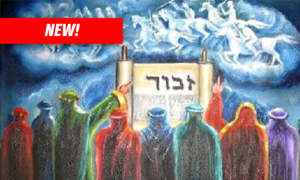(Sicha, 20 Menachem-Av 5749)
A. The Yartzeit of Rabbi Levi Yitzchak Schneerson
On 20 Av, 1989, hundreds of children from Chabad summer camps joined the Rebbe for the Minchah prayer, coming especially for the occasion. The Rebbe began speaking about how his father’s entire life was famously devoted to Torah study, and it would be fitting to quote a teaching of his on a Mishnah being studied for his yartzeit, a teaching that could be understood by children.
B. The Mishnah
In tractate Mikvaot, the Mishnah discusses immersion of vessels that became ritually impure, and how a needle immersed on the mikvah steps is rendered pure. (Source 1)
C. The Needle’s Purpose
The deeper meaning of the Mishnah:
A needle sews and connects two distinct entities, making them one.
In the deeper sense, this refers to connecting this world’s materialism to G-d. For example: when a Jewish child makes a blessing over a glass of water, saying “Shehakol nihiyah bidvaro,” they are connecting the physical water with G-d.
When sewing, a hole must be pierced in the cloth for the needle to pass through. In the spiritual parallel, in order to connect the physical with G-d, a “hole” must be made in the physical. This hole is made with the sharp tip of the needle—a Jew’s strength to not be intimidated by the world’s physicality.
D. The Purity on the Front Lines
To connect the physical with G-d, we cannot remain in the Holy Temple—we must go out into the world. For that we need to immerse ourselves, so that we aren’t affected by the impurities of exile and the world.






